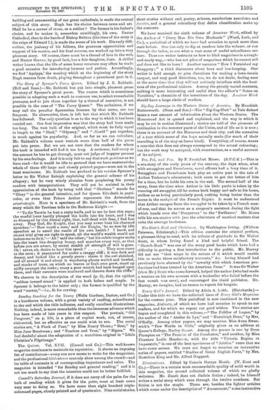The Story of Speneer's Faery Queen. Edited by J. E.
Rabbeth. (Bell and Sons.)—Mr. Rabbeth has put into simple, pleasant prose the story of Spencer's great poem. The course which is sometimes possible in adapting such a work to common use, to select remarkable passages, and to join these together by a thread of narrative, is not possible in the case of " The Faery Queen." The archaisms, if we may call the peouliar Spenserian licenses by that name, are too frequent. No alternative, thee, is left but that which Mr. Rabbeth has followed. The only question is as to the way in which it has been carried out. Our first impression was that the story had been made too long. The vast bulk of the original, which mast be fully equal in length to the " " Odyssey," and " " put together, is much against its popularity. And, as far as wo can calculate, Mr. Rai:drab's volume must contain more than half of the poem put into prose. But we are not sure that the readers for whom the book is intended will find it too long. A reviewer, half-crazy at the amount he has to get through, most not judge of happier persons by his own feelings. And it is only fair to say that such portions as we have read—for it would be idle to pretend that we have mastered the whole of these 490 large and closely printed pages—were not in the least wearisome. Mr. Rabbeth has prefixed to his version Spenser's letter to Sir Walter Raleigh explaining the general scheme of his allegory ; but be very wisely abstains from perplexing his young readers with interpretations. They will not be assisted in their appreciation of the book by being told that " Gloriana " stands for "Glory" is the general intention, and for Queen Elizabeth in parti- cular, or even that Prince Arthur represents the Aristotelian acyctAmpoxia. Here is a specimen of Mr. Sabbath's work, from the story which Sir Trevisan tells to the Redcross Knight " To Sir Terwin he lent a rusty knife, and to rim he lent this rope; the woeful lover hastily plunged the knife into his heart, and I was no dismayed by this dismal sight, that, half-dead with fear, I fled fast. away. Pray God, Sir Knight, that you may never hear his charmed speeches.'—` How could a man,' said the Knight, ' be so won by idle speeches as to assail the castle of his own health I know, and recent trial gives me right to speak, all the world's wealth would not induce use to do it.'—' Ah!' said the other; ' but his subtle tongue melts into the heart like dropping honey, and searches every vein, so that before you are aware, by secret stealth all strength of will is gone.
Oh ! never, air, desire to hear him speak !' They soon came to the cave ; it penetrated far under a craggy cliff ; it was dark and dreary, and looked like a greedy grave above it the owl shrieked, and all around it and about it wandering ghosts wailed and howled, and stocks of trees, on which no leaves or fruit ever grew, stood up stiffly amongst the rocks ; many a poor wretch had been hanged upon them, and their carcases were scattered and thrown down the cliffs." We observe in the description of the wood (p. 3), that the epithet "seldom inward sound" is applied to both helms and maple. In Spenser it belongs to the latter only ; the former is qualified by the word "carver,"—i.e., fit for carving.























































 Previous page
Previous page